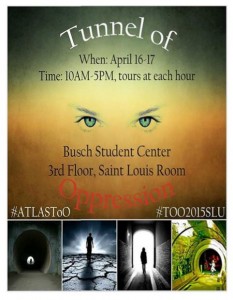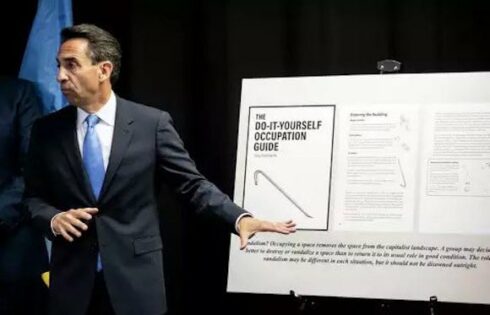
ANALYSIS
Before entering, I was warned that the following attraction might cause “physical and emotional discomfort.”
No, I wasn’t about to about to ride the Wicked Twister or climb Mt. Everett. I was merely entering the “Tunnel of Oppression.”
The Tunnel of Oppression is an annual interactive display hosted at universities across the nation, and my campus – Saint Louis University – is no exception.
The tunnels are used to ostensibly give students a first-hand experience of what it feels like to be on the receiving end of racism, sexism, and all the other isms, known and unknown. Though, it seems they have a specific target: white, male, heterosexuals.
Welp, that’s me.
So, with all my “privilege” intact, I steeled myself for the journey and entered the darkened “tunnel” – a mix of picture boards, videos and interactive experiences set up in a dimly lit ballroom.
There were five “rooms,” each dedicated to a different oppression.
Room one, naturally, touched on the “oppression” felt by international students at Saint Louis University with a video of student interviews. Apparently a sense of wanting to belong on campus and feelings of homesickness are forms of oppressions these students face. Funny, I’m not sure there is a college student in the entire nation that can’t relate to that.
In the video, students also touched on peers discrediting their English and asking stupid questions about their homelands. Huh, also known as minor cultural misunderstandings at best and ignorance at worst? But what do I know.
Room two featured a short film from the British Disability Rights Commission: a fictional bizzaro world in which handicapped people are the norm, and an “able-bodied” person must make do with weird stares and wheelchair-only busses and such.
Sure the video intended to challenge us on own perceptions, and remind us that it can be frustrating, really frustrating, to have a disability. But to suggest most people are malicious toward the handicap? That felt a bit oppressive to me.
On to room three, which also featured a video, this time on LGBT youth homelessness, healthcare and Transphobia. The video highlighted specific cases of discrimination toward LGBT individuals, included interviews from doctors and nurses who explained why LGBT patients shouldn’t be denied treatment, and included stats on LGBT and transgender suicides and murders.
A compelling argument, and certainly loving one’s neighbor is a good message for any Jesuit institution.
The fourth room featured the Delmar Divide: economic and racial disparities between different neighborhoods in the St. Louis-area. The haves and the have nots. An issue brought back to the forefront following the unrest in nearby Ferguson.
The room included poster boards explaining the Divide and offering statistics on income and education, and its history, with its racist roots. That part is truly lamentable.
Yet the Divide was created decades ago in part by construction of public housing north of Delmar that aimed to help poor minorities. Didn’t work out as well as well-meaning politicians and the feds had planned. But is it an example of oppression, or good intentions with bad outcomes? I wouldn’t have dared to ask.
In the final room, the Tunnel of Oppression’s pièce de résistance, an audio recording spewed vile words at my small group for 30 seconds: “dick, pussy, fag, n-word,” and on and on. Ouch. Yes, at this point I was indeed feeling oppressed.
After that, we were ushered out of the tunnel and asked what we learned; an attempt to facilitate “dialogue,” which felt forced and so distant from what real dialogue entails.
One gal gets an A, she told organizers how she understood how privileged she was after going through it. Others offered up reactions such as “tense, sad, frustrated.”
Meanwhile, my brain raced for something to say, the wrong word and it could get about as awkward as that last room we went through.
“Educated,” I finally managed.
The organizer nodded, and gave a quick smile.
“Thanks for sharing,” he added.
 Yes, I think I passed the test.
Yes, I think I passed the test.
College Fix reporter Nathan Rubbelke is a student at Saint Louis University.
Like The College Fix on Facebook / Follow us on Twitter
IMAGE: Main, Home Alone; Inside, Facebook screenshot






Please join the conversation about our stories on Facebook, Twitter, Instagram, Reddit, MeWe, Rumble, Gab, Minds and Gettr.